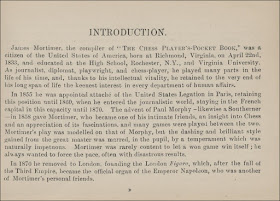This sixteenth edition, and twenty-seventh thousand, is an enlarged version of The Chess Player's Pocket-Book and Manual of the Openings first published in 1888. The fifteenth edition had been published in 1906 and this latest edition was published posthumously, six years after Mortimer's death in 1911.
This little book contains a tabulated analysis of the openings with each line taken to 10 moves and further continuations to some lines in the Appendix.
However, the main interest lies in the Memorial Introduction giving details of Mortimer's fascinating life, an outline of which follows:
Born in Richmond, Virginia in 1833.
Resided in Paris from 1855 to 1870 as attaché to the United States Legation.
An intimate friend of Paul Morphy with whom he played many games. (Although none are recorded in the many Morphy games collections that I have checked)
Emperor Napoleon III (nephew of Napoleon Bonaparte) was another personal friend.
Moved to London in 1870 and founded the London Figaro which provided a chess column by Löwenthal and later, Steinitz.
Imprisoned following a libel case against the London Figaro.
A playwright with over 30 plays to his name, Mortimer was acquainted with many of the leading actors in England during his 40 years here.
At the age of 77 he travelled to San Sebastian for the International Tournament of 1911 as special correspondent of a leading London daily, (he was editor of the Daily Mail and Evening News). However, he was taken ill and died there on 24th February 1911.
Much more detailed information on Mortimer's life can be seen in the feature article; James Mortimer: Chessplayer and Playwright at Edward Winter's Chess Notes site.
Mortimer wrote one other chess book: The New Century Chess-Book, London 1901. A new and enlarged edition was published in 1906 with later reprints.
________________________________________
Morphy's Games of Chess and Frère's Problem Tournament, by Thomas Frère, New York 1859.
This is another book rushed out in the wake of Morphy's accomplishments but, as the author says in his Preface " it is simply a supply for a universal demand"
1859 saw the appearance of seven new works on chess in the English language, all published in America:
Science and Art of Chess, by J Monroe, New York.
The Chess Player's Instructor, by Charles Stanley, New York.
The Chess Handbook, Philadelphia. (An abridged version of Staunton's Chess Player's Handbook with new games and problems, possibly edited by Mears (Betts)).
The Book of the First American Chess Congress, by Daniel Fiske, New York.
The Exploits and Triumphs in Europe of Paul Morphy the Chess Champion, by Frederick Edge, New York. (A similar book was also published in London in the same year: Paul Morphy, the Chess Champion.)
Morphy's Games of Chess and Frère's Problem Tournament, by Thos. Frère, New York.
Morphy's Match Games, by Charles Stanley, New York.
The imprint on the reverse of the title page of Frère's book states "Entered according to Act of Congress, in the year Eighteen Hundred and Fifty-eight", but the Preface is dated January 10th 1859; this was probably the first of the books published in 1859.
This little 144-page book has attractive blind-stamped covers and my copy has four blank leaves at each end. Frère gives a sketch of Morphy's life taken from Fiske's Chess Monthly magazines. There are 103 games with light notes but no diagrams.
The final 30 pages give 39 problems, on diagrams, from Frère's Problem Tournament followed by solutions. The problems are from a tournament conducted by Frank Leslie's Illustrated Newspaper of which Frère was chess editor. The unusual first prize, awarded to Theodore M. Brown of St. Louis, Mo., was "a collection of portraits of all composers who saw fit to send a single three-move problem accompanied by their likeness"
________________________________________
© Michael Clapham 2020















No comments:
Post a Comment